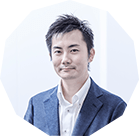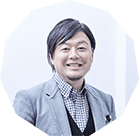EXPERT SUPPORT
- HOME
- EXPERT SUPPORT
- VP CROSS TALK
VP CROSS TALK
PROLOGUE
UTEC's VPs support the portfolio companies from the inside the organizations by applying each of their expertise and skills. This is a rare position in Japan, but why did the professionals who are now working as VPs choose this path? These four experts who currently support the portfolio companies internally were interviewed to talk about the best part of working as VPs.
TALK MEMBER
-

Venture Partner, CPA
Tomohiko Okiyama
-

Human Resource Manager
Hirofumi Oki
-

Venture Partner, Patent Attorney
Atsushi Shimada
-

Venture Partner, M.D.
Hiroaki Kobayashi
SECTION 1 From Experts in Each Field to VPs
UTEC’s VPs have been active as professionals in a variety of fields. How did they end up in the world of venture businesses?
- Would you tell us about your backgrounds and how you came to become VPs?
Okiyama
I got my certified public accountant certificate while I was still in college then started working at a major auditing firm. I was mainly in auditing and accounting advisory for about five years, but I wanted to develop my career growth horizontally with core accounting and finance skills, so I moved to an independent advisory firm where I mainly worked as a financial advisor for M&A.
Originally, I had a brief idea that in the mid- to long-term, I wanted to become a CFO where I could be entrusted with overall business management of an operating company. While working on M&As in my previous position, I heard about cutting-edge technologies and approaches from various clients, and began to become interested in startups. As I heard more about the latest initiatives in the U.S. at internal training programs, I began to want to work more closely with entrepreneurs with cutting-edge technologies and great ideas about revolutionizing society, and that I would like to work with them from the early stages of their business.
While looking for different positions through a recruiting agent, I was introduced to the VP position at UTEC. If I jumped right into working for a startup, there was a risk that we might not find ourselves a good match in terms of values and direction. However, working with various portfolio companies as a VP allows you to know if it is a good fit for you or not before you switch jobs. And UTEC was generous enough to let me join them "to find the right partner for my future," so I decided to take this step to join as a Venture Partner.
Oki
My background is based on HR (human resources / organization). While I was still a student, I worked for an HR startup of about 10 members, followed by another startup after graduation, then at a recruitment agency specializing in higher level executives. There, we set up a team to specialize in biotech startups, one of whose clients back then was a portfolio company of UTEC. That's when I came across UTEC and was approached by its president, Mr. Goji. I decided to give it a try at UTEC because I have always had a passion for startups and wanted to make the industry more exciting. Also, there were only a few people in Japan who supported the HR area of the portfolio companies as VCs at that time, so I decided to do it because I thought I could pioneer a profession that no one had done before.
Shimada
I was a patent attorney to start with, handling intellectual properties at a patent law firm. But I wanted to actively manage intellectual properties within an operating company, so I switched to work at a major pharmaceutical company. After working as a project liaison with companies overseas, I was transferred to the U.S. where I was in charge of business development.
Working with biotech startups in the U.S. made me realize the strength of the ecosystem of American startups and their power of innovation. If Japan can't enhance its startup ecosystem, it will fall behind the rest of the world. With that in mind, I started looking for a job after returning to Japan, hoping to work in a startup-related field.
Actually, Mr. Oki was my agent at the time. He introduced me to UTEC, then I was surprised to find that Mr. Oki also joined before I knew it (laughs).
Kobayashi
I have an unusual background in the startup world. Originally I was a physician specializing in emergency intensive care. On the other hand, I have been interested in how medical technology can change the world since I was a medical student, and I wanted go onto the business side of it one day. Then, someone I knew happened to start a medical device startup, so I joined them and have been on the business side ever since.
After working for a startup to launch a medical device business from Japan, I wanted to study business, especially the ones related to healthcare, so I went to the U.S. to study at a business school and get an MBA. Once I came back to Japan, I worked in the business development team of a major medical device manufacturer. The Singaporean company where I interned while studying abroad later received investment from UTEC, and they asked me if I would be “interested in helping them enter the Japanese market as VP”, which led me to where I am today.
SECTION 2 That's Why Hands-on Support is So Exciting!
How do you apply the expertise you have developed in your early career to the portfolio companies? We also talked about the appeals of a VP job.
- Please tell me what your current role is.
Okiyama
Currently I'm providing a variety of support to portfolio companies that are short of human resources for overall business management. When you say business management in general, there are a variety of stages in the life of a company, including: 1) the seed / early stage when the company has just been established; 2) the middle stage when the business is starting to do well and the company is trying to build a structure for an IPO; and 3) the later stage when the preparation work for the IPO is in full swing and the administrative department is overloaded with work. Each of these stages has a different a requirement.
For example, during the seed stage, no resources are available for administrative work, so all the administrative tasks that the company needs are not be covered. Hence to meet these needs, there were times when I had to go to the pension office, ward office, and other government offices to take care of the new employment procedures. Onto the middle stage, you will be involved in more CFO-like responsibilities, such as working with the management team on fundraising strategies and dealing with external parties, including auditors. On the other hand, during the period right before an IPO, there will be a shortage of management personnel, so we need to be able to support the portfolio companies by getting involved hands-on.
In my previous jobs at the audit firm and advisory firm, I also provided advice to clients, but those were just external support. The client may have felt that I was looking down on them. On the other hand, I can now talk to them as someone within their team from the same perspective. It's very exciting to be able to be involved in the decision making and execution.
Oki
I have two main responsibilities. One is the sourcing of management personnel, also known as CxO personnel, for our portfolio companies. This is not only for our existing portfolios, but also for co-founders, to connect them to entrepreneurs and researchers who are considering starting their own business. Especially in the early stage of a company's development, there are many situations where the technology is strong but there is a lack of a good management team to turn it into a successful business.
My other role is to provide support in the area of human resources for our portfolio companies. There are a variety of tasks that require hands-on work, such as temporarily residing at a company and developing a recruitment flow from scratch, and providing advices in the HR area. There are only few funds that provide this kind support, so it's quite rewarding.
Shimada
I provide hands-on support to portfolio companies in the life sciences field. The basic growth strategy of startups in this field is to collaborate with major corporations and have them use their intellectual property and technology. Since I used to work for a pharmaceutical company, I apply my network to introduce people to the portfolio companies, and when we have a specific deal, I work together with the portfolio company from deal structuring to building financial terms, handling of intellectual property, and even valuation and negotiation.
I was on the buyer's side before, and while the buyer also encounters many difficulties such as internal approval and stakeholder management, our portfolio companies are on the seller's side. Our job is to sell seed science and technology that do not yet exist in the world to major pharmaceutical companies. Now that I am on the seller's side, I finally realize how difficult it is to get people to understand and use innovative technologies that have never existed before. However, although it is a very challenging process, the process of creating something from scratch is irreplaceably fulfilling.
Kobayashi
I'm assisting two of UTEC's overseas portfolio companies in setting up their business in Japan. Well, we are still in the pre-launch stage. We are doing research on the market in Japan, as well as developing partnership with major corporations, and other activities to lay the groundwork for building sales as soon as possible.
Neither of the two companies has an office in Japan, so now it's like I'm running their Japan branch with my investment partner. Am I working for UTEC or the portfolio company? I focus so much on the work of the portfolio company that it almost makes it look like I'm working for them.
SECTION 3
The Appeal: You are Expected
to Have a High Level of Professionalism
Many of our VPs have work experiences with major corporations. They will tell you how they work at UTEC.
- How do you normally work on your tasks?
Okiyama
Mr. Kobayashi said "I wonder if I'm an employee of UTEC or the portfolio company," and I feel the same way. First of all, I spend about 70% of my hours at the portfolio company, and 30% at the UTEC office. Even when I'm at UTEC, I'm thinking about the portfolio company, so practically you can say I'm a member of the portfolio company.
As a VP, especially in the accounting and finance field where I work, it would make my job very difficult if the portfolio company thinks "the shareholder sent me an annoying watchdog," which makes all three parties unhappy: UTEC, the portfolio company, and myself. In that sense, it's good that I am deeply involved in the portfolio company’s side.
Shimada
It's true that the relationship with our portfolio company is important. I often go on business trips to the U.S. with the team members of our portfolio company, and as we don't have much budget for each of us to get a private room, we all rent a room together on Airbnb and cook for ourselves. For me, it has helped a lot with team building.
Oki
For myself, I guess I spend about half of my time at UTEC and the other half at the portfolio's office. Working at UTEC makes me feel that I'm expected a high level of professionalism. Each individual is required to have a high level of professionalism to be able to make the best decisions on their own.
Shimada
In fact, you rarely receive detailed instruction from the UTEC. It's like they give you this big canvas and tell you, "We are going to have you paint a picture on this, but what you are going to paint and how you want it done is all up to you." The position of VP itself is like a canvas, and the professionalism expected for that is really high.
Kobayashi
I agree. For my case, the portfolio company is overseas, and they leave all the details to me. UTEC and our portfolio companies share the same goals, but we are expected to think about the process and prioritize them to reach those goals, so that's how we perform our roles. It is quite challenging, but I'm more comfortable with this way of working.
SECTION 4
What We Want to Accomplish at UTEC,
and Our Individual Dreams
Just as their different backgrounds and career path, each of their dreams are also different. Last but not least, they talked about their thoughts on future.
- Would you share your future goals?
Okiyama
For my personal career, I came to “find my partner” at UTEC, so I hope to meet a portfolio company where I can be a good fit and transfer there. On the other hand, I also have a goal as a member of UTEC. As I assist several investees now, I feel that all of them have similar corporate issues. That means we should be able to horizontally apply practices that went well. I hope to sort that out while I'm at UTEC.
Oki
You can say the same thing about HR. I'm in charge of a wide range of companies, about 30 accounts at a time, and if you are talking about the number of hiring position, it could go up to 50 or so. In that process, we are collecting data from cases that went well. I want to make those into a system and expand it horizontally.
As for sourcing the CxO talent, I'm working to build a community of candidates.
We believe that professional talents are indispensable for startups with strong technology so we are always looking for people who can accelerate the business of our portfolio companies, including those in the pre-establishment stage. We started the “UTEC Startup Opportunity Club”, an invitation-only community to gather such professionals.
Shimada
I have had many opportunities of supporting different companies as a VP, and so I think the time is near when I will select one company to join full time. . In the U.S., there are cases where startups have become mega-pharma companies. It’s not completely impossible in Japan. I would like to participate in creating a global biotech startup from Japan.
Kobayashi
I have just joined the company, so my first priority is to contribute to the business of our portfolio companies. On top of that, as a VP with clinical and medical device background, I would like to contribute to enhancing UTEC's capability in that area.
As for my personal career, the advancement of medicine with technology itself is exciting and interesting. As long as I get to be involved in that, the position doesn't really matter to me, whether a VP of UTEC or an employee at the startup or any major corporation. Regardless of my position, I would be happy if I could contribute to the development of medicine through my strengths.
CONTACT
If you are interested in supporting UTEC,
please contact us using the contact form.